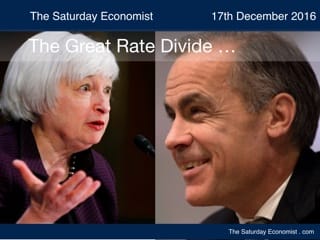 The Fed moved to hike rates this week. Growth in the economy, a strong jobs market and a moderate rise in inflation, prompted the move. "In view of realized and expected labor market conditions and inflation, the Committee decided to raise the target range for the federal funds rate to 1/2 to 3/4 percent." The stance of monetary policy remains accommodating, supporting a further rise in employment and inflation. Not so accommodating, by the end of 2017, the fed funds rate is expected to be 1.4% with a further three moderate rate rises expected over the next twelve months. In the U.K. the MPC voted unanimously to keep U.K. rates on hold. The level of government bond investment was held at £435 billion. The £10 billion corporate bond adventure was also maintained. So what is going on? This week, the ONS announced retail sales up 6% in November, unemployment down to 4.8% in October and inflation jumping to 1.2% in the latest month available. The CBI industrial trends survey, reported strong data from the manufacturing sector and the Bank of England's own survey of household perceptions confirmed spending plans remained unaffected by the referendum decision. Janet Yellen admitted the FOMC is behind the curve in escalating rates. If the FOMC is behind the curve, the MPC must be beyond the bend. The Bank of England is fretting about a post Brexit condition which doesn't exist as yet. The agreement to leave, may take ten years to determine, according to Sir Ivan Rogers, the U.K.'s permanent representative in the EU. U.K. Growth in 2016 will be over 2%. We see no reason why a similar level will not be achieved in 2017. U.K inflation is set to bounce well above target in the first quarter of 2017. The correlation between U.S and U.K rates is high [0.8442]. Our guidance is "Watch the Fed and add three months". The MPC should make the move to "normalise" rates, reversing the premature and misguided decision to cut rates earlier this year. Retail sales boom continues ... Retail sales were up by 5.9% in November. Online sales were up by almost 25%, accounting for 16% of all retail [non fuel] activity. We expect online sales to account for one in five transactions within the next five years. Multi channel, the key to survival in the world of "surf and turf". The return of inflation is evident within the retail data. In the first quarter of the year, retail sales volumes were up by over 4% but values increased by just over 1%. By the final quarter of the year, the disparity will have disappeared. Retail sales were up by 5.9% in volume and 5.9% in value. Retailers love inflation, albeit gently at first. Inflation CPI basis jumped to 1.2% in November up from 0.9% prior month. Service sector inflation increased by 2.2% and goods inflation increased by just 0.2%. Evidence of inflation yet to come is presented in producer prices. Output prices increased by 2.3% and input prices increased by almost 13%. Import prices are affected by the depreciation of Sterling. Fuel costs are exacerbated by the rise in oil prices. Brent crude closed over $55 dollars this week. Sterling closed at $1.249. The year on year increase, Sterling based was almost 30% in November. In December the increase will be over 70%. In January and February fuel costs Sterling based will double, up by 100%! Jobs market ... strong growth continues ... The unemployment rate was 4.8% in October. 1.6 million were unemployed compared to 1.7 million in the same period last year. A total of 31.8 million were in work, up by 342,000 over the year. The claimant count rate was unchanged at 2.3% in November. The actual number increased slightly to 809,000. The number of vacancies fell to 748,000. That's still almost one vacancy for everyone on the claimant count register. Earnings increased to 2.8% in the latest month for October. Private sector pay increased to 3.1%. Leisure sector earnings increased by over 4%. Construction pay jumped to 8.6%. Wage inflation is set to accelerate in 2017 as the U.K. copes with full employment and a strong economy. Inflation CPI basis will increase to 3% to 4% in the first quarter as import costs are impacted by the weakness of Sterling. An inflation hike just in time for the pay round? It really is time to follow the Fed and make the move to leave Planet ZIRP. We expect the first rate rise in March next year ... So what happened to Markets? Markets, were up - the Dow closed at 19,828 from 19,690. The FTSE closed at 7,011 from 6,954. Sterling was down against the Dollar to $1.249 from $1.257 and up against the Euro to €1.195 from €1.193. The Euro moved down against the Dollar at 1.044 from 1.054. Oil Price Brent Crude closed at $55.19 from $54.20 The average price in December last year was $38.53. UK Gilts - yields moved up. UK Ten year gilt yields closed at 1.45 from 1.44. US Treasury yields moved to 2.60 from 2.42. Gold closed at $1,137 from $1,1575. John That's all for this week ... This will be the last Saturday Economist edition for 2016. I would like to wish everyone a Merry Christmas and a Happy New Year. We will be back on the 7th January 2017 entering our sixth year of updates. As always your support and comments are much appreciated. © 2016 John Ashcroft, Economics, Strategy and Social Media, experience worth sharing. ______________________________________________________________________________________________________________ The material is based upon information which we consider to be reliable but we do not represent that it is accurate or complete and it should not be relied upon as such. We accept no liability for errors, or omissions of opinion or fact. In particular, no reliance should be placed on the comments on trends in financial markets. The receipt of this email should not be construed as the giving of advice relating to finance or investment.. _________________________________________________________________________________________
0 Comments
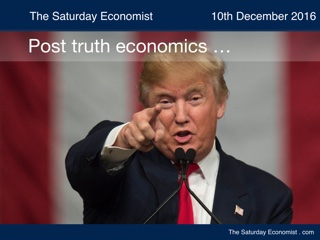 Oxford Dictionaries has declared “post-truth” to be the chosen international word of the year. Use of the term increased by 2,000% in 2016 largely due to the U.S. election and the U.K. referendum. The words of Trump and Farage, of Boris Johnson and the Double Decker Bus pay tribute to the term. “Post-truth” denotes circumstances in which objective facts are less influential in shaping opinion than appeals to emotion and personal belief.” It is hardly a new phenomenon. British philosopher Bertrand Russell said: “If a man is offered a fact which goes against his instincts, he will scrutinise it closely, and unless the evidence is overwhelming, he will refuse to believe it. If, on the other hand, he is offered something which affords a reason for acting in accordance to his instincts, he will accept it, even on the slightest evidence.” JFK would point out, The great enemy of the truth is very often not the lie -- deliberate, contrived and dishonest … but the myth, persistent, persuasive, and unrealistic. Belief in myths allows the comfort of opinion without the discomfort of thought. When presented with information which opposes that which we already believe, the natural reaction is to deny the new information rather than change our behavior or belief. We call this confirmation bias, easier to accept than to challenge. In our research the training is to always revert to basics, to challenge and identify first premise. Back to foundations, testing every statement made, ensuring the evidential is identified to support the hypothesis. Analysis, Analysis, Analysis the mantra. The guideline is as valid for business as it is for academic research. The great challenge on acquisition of any business acquired, was always to identify and expose the “management myths” often the foundation of misguided strategy. Populism and post-truth … Playing to public opinion or populism is a dangerous game to play. A simple message stated with intense frequency is the mode of populist conversion. Making America Great Again, Making Britain Great again, taking back control, reclaiming our borders, build a wall, any wall. We heard so much of this during the Presidential election and the U.K. referendum. Post truth strays to the boundary of “beyond belief” but not further into territory which is easily denied. And what of Globalisation … It is said the referendum result in the U.K. was in part a vote against “globalisation”. Amazing the intelligence derived from one tick or a cross! Most voters myself included would be quite unsure about what is actually meant by the term. Globalisation is a post truth tautology. It certainly is interpreted in different ways. According to a recent speech by Governor Carney in Liverpool. 70% of Chinese workers believe that globalisation creates jobs and increases wages. U.S. workers believe that globalisation leads to job losses and lower wages. A belief exploited on the campaign trail by President-elect Trump to great effect, China and the U.S.A. are at different stages in the manufacturing life cycle. Globalisation reflects the passing of empires ... Globalisation reflects the passing of Empires. In the late 30s, the U.K. exported more manufacturing goods than the USA. Post war period begat the Golden Age of American Manufacturing. By 1953, US manufacturing exports were nearly twice as large as the UK. By the mid 1970s Europe and Japan rebuilt. Japan and Germany were the fast growing players in international trade. By 1976 America’s share of global trade had fallen back to pre war levels. US manufacturing employment has been devastated since 2000. Over the past fifteen years, the manufacturing sector lost 5.3 million jobs. The tokenism represented by the Carrier 800 jobs saved, will not reverse the tectonic shifts in global trends. Don’t blame Mexico. The contribution of south of the border offshoring to the loss of US manufacturing jobs has been modest. According to the Bureau of Economic Analysis, employment in Mexican manufacturing plants owned by US firms increased by just 50,000 from 520,000 in 1999 to 572,000 in 2013. The 800 jobs saved at Carrier represent a tiny fraction, of the 12 million Americans employed in manufacturing. In Indiana, over 500,00 jobs are in the manufacturing sector, a figure that has dropped more than 20 percent since 2000. And what of China … Steve Jobs would say “If you want to build a team find an enemy”. Jobs chosen enemy was first IBM, then Microsoft. Trump’s chosen enemy to receive the invective is China. No need for a war on two fronts, hence a rapprochement with Russia, an olive branch waved to the mailed fist in the East. The zephyr created may push Erdogan to Putin and out of NATO. “Globalisation” or “internationalisation” is not a particularly new phenomenon. The age of empire from the Greeks to the Romans, the rise of China as the middle kingdom. Heroin from India to China, travels along the silk road, the slave trade from Africa to North America and the Caribbean. Bananas and cotton flowing back to Europe on the back of unpaid labour in the colonies. Empires wax and wane. In 1978 China came into the world market, followed by India, Russia, Eastern Europe, Brazil and Turkey. China’s entry into the World Trade Organisation cut the average import tax from 14% to 3% by 2015. China in turn now faces a “hollowing out” of low added value products like textiles to less expensive labour sources in Vietnam and Indonesia. The cycle continues. Globalisation is a process of sharing wealth. If we are to avoid the nightmare of economic refugees from North Africa drowning in the Mediterranean, we must do more to deal with income inequality between North and South across the globe. Otherwise the Mediterranean will become the equivalent of the mediaeval moat, protecting fortress Europe from the raving hordes of the North African shoreline. Post truth economics … The post truth phenomenon is just as valid in economics. So much of contemporary theory is derived from emotion and belief drawn from theoretical indoctrination at an early stage. As early students of economics, much of the theory just didn’t make sense. We were urged to learn “parrot fashion”, no time to challenge if we were to be afforded the time to cram. So today, too many are ready to accept the concepts of the meandering NAIRU, the J curve and the alleged positive impact of depreciation on the U.K trade balance. Life on Planet ZIRP is creating a crisis for capitalism. Low interest rates are mis pricing capital in a capitalist world. Central bankers may believe the equilibrium real interest rate is falling as a result of geo demographics, lower growth and an excess of savings over investment. Central banks set rates. Little heed is paid to the trillions of dollars, euros and pounds squandered on the acquisition of government bonds in the U.S. Europe and the U.K. Central banks drive up prices and drive down yields. Creating "the biggest bond price bubble in history". Low yields may beguile borrowers, they damage savers and exacerbate pension fund deficits. Flight to safety ... The Governor may believe institutions are buying gilts at low rates in a “flight to safety”. This is a central bank post truth. Institutions buy as a statutory obligation to cover future liabilities. Ironically, as yields fall, they are obliged to buy more. There can be little capital safety in an overpriced asset. It was James Carville in the Clinton administration who said “I used to think if there was reincarnation, I wanted to come back as the president or the Pope. But now I want to come back as the bond market. You can intimidate everybody.” In the current cycle, it is the bond markets, intimidated by the actions of the central banks. The “shock and awe” tactics of QE are paralysing perceptions of how bond markets really work. U.K. gilts issued by the Debt Management Office, bought by the Bank of England, underwritten by HM Treasury, yields paid refunded, is not the way it is supposed to work. The wake up call is coming as U.S base rates start to rise. U.S. bond yields have risen to 2.4%. They are set to rise further in 2017. And what of Trump in the White House? Trumpeter economics will push up growth along with inflation, interest rates and bond yields. The U.S. national debt is set to rise to over 100% of GDP. We know the Trump business empire has experience of managing debt. Some stylists may think the President-elect needs a haircut. The same cannot be said of U.S. bond markets. “No. I don’t want to renegotiate the bonds. But I think you can do discounting, I think, you know, depending on where interest rates are, I think you can buy back. You can – I’m not talking about with a renegotiation, but you can buy back at discounts, you can do things with discounts. …I would refinance debt. I think we should refinance longer-term debt.” – Donald Trump, 10 May, 2016. [My thanks to the M&G Bond Vigilantes] What then of the flight to safety? The reaction of the bond markets would render the taper tantrum a mere storm in teacup. Let someone Twitter about that. That's not a post truth, more of a promise! 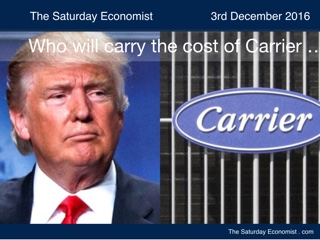 President-elect Donald Trump was back in Indiana this week. A victory tour of sorts. Carrier had cancelled the planned move of the hot furnace plant to Mexico. @ We are pleased to have reached a deal with President-elect Trump & VP-elect Pence to keep close to 1,000 jobs in Indy. More details soon. Twitter explained.The President popped in to share the great news with the workforce. Part of United Technologies Corporation, a leading provider to the aerospace and building systems industries worldwide, Carrier is a world leader in high-technology heating, air-conditioning and refrigeration solutions. The Sistine Chapel in Vatican City, the Great Hall of the People in Beijing, the Great Library of Alexandria are some of the high prestige projects. Don't expect a repeat order from China anytime soon, the caveat. Planned savings of some $60 million dollars would have been achieved by the move to Mexico. Labour rates of $10 dollars an hour offered a significant reduction to the $20 - $30 dollars payable in Indianapolis. The decision will affect around 1000 jobs in the short term. The decision just before Christmas was a huge boost to morale at the plant. "Some people are crying back there" said Trump. Probably the ones who would still be losing their jobs. As the letter explained, the decision is good news but not for everyone. Part of the Illinois workforce would still be losing their jobs as a result of the decision to relocate to Monterrey. What cost the deal ... A generous $7 million dollar tax deal proved to be the key factor in the decision to stay in state. That and the prospect of a punitive tariff charge of 35% on imports from Mexico. UTC is also dependent on 5% - 10% of revenues from the Pentagon largely as a result of the Pratt Whitney engine business. Did this figure in the conversation Trump was asked. "It wasn't mentioned. I didn't feel I needed to". Fair enough. Greg Hayes the CEO of UTC understood all too well, the implications of "Incurring the wrath of an incoming administration". Is this the start of a new deal for U.S. manufacturing? Not really. Headline deals from incoming administrations are nothing new. JFK wrangled with the steel barons to forestall a significant price hike. Reagan introduced a bike tariff to protect Harley Davidson. Obama slipped in the tariff on tires to protect the domestic motor trade. Not all job losses were saved at Carrier, Ford still plans to establish a small car plant in Mexico and the iPhone assembly won't be repatriated anytime soon. Oreo cookies will relocate to where the mouths are. Trump may threaten and menace the manufacturing base remaining in the U.S with threats of sanctions and tariffs, such tariffs are counter productive. Seven years ago, the Obama administration accused China of unfairly subsidizing tires. It imposed tariffs reaching 35 percent. A subsequent analysis by the Peterson Institute for International Economics, calculated the effect. Some 1,200 American tire-making jobs were preserved but American consumers paid $1.1 billion extra for tires. That prompted households to cut spending at retailers, resulting in more than 2,500 net jobs lost. Businesses are dependent on international trade for essential components in manufactured goods. Tariffs on trade increase costs of domestic manufacture at the expense of local jobs. The U.K. computer industry protected by a tariff on semi-conductor components is witness to that. Higher wages and higher costs will accelerate investment in automation and robotics. A Big Mac and Fries delivered thanks to Artificial Intelligence, the outurn. Trump protectionism and moves to hinder free trade will hamper job creation in the long run. Haldane urges caution on rate rise ... No such qualms in the short term, the U.S unemployment rate fell to 4.6% in November, the lowest since August 2007. U.S. employers added 178,000 jobs in the month largely in the service sector. Manufacturing has lost 54,000 jobs over the past year and mining jobs have been cut by over 80,000 over the period. Construction has increased employment by over 150,000. Professional and business services added nearly 600,000 jobs in comparison and the healthcare workforce increased by over 400,000. Trump will inherit a strong economic base into which will be injected further infrastructure spending, tax cuts both personal and corporate. Time to share the wealth with the rest of the world, especially south of the border. GDP per capita in Mexico is less than one third of the U.S.A. Improving economic growth will eliminate the wage gap, encourage democracy and drive out corruption. The drug industry is worth some $20 to $30 billion to the Mexican cartels. 90% of the weapons used to protect the gangs are imported from Texas. Walls and tariffs will not impede the development of the drug trade any time soon. Trade protection and Trumpeter economics offer a King Canute approach to economic progress on a much broader scale. The latest jobs data suggests the Fed is likely to make the move to hike rates at the meeting at the December meeting. Andy Haldane Chief Economist at the Bank of England has urged for caution before the MPC makes a similar move. Inflation is set to spike. Oil price Brent Crude closed at $54 dollars this week. The average price in December last year was $38.53. Dollar spot was $1.50. A 70% increase in oil prices will impact on CPI next quarter. It really is time to follow the Fed ... So what happened to Markets? Markets, were mixed - the Dow closed at 19,172 from 19,125. The FTSE closed at 6,730 from 6,840. Sterling was up against the Dollar to $1.268 from $1.245 and up against the Euro to €1.188 from €1.175. The Euro moved up against the Dollar at 1.067 from 1.059. Oil Price Brent Crude closed at $54.12 from $47.56 The average price in December last year was $38.53. UK Gilts - yields moved down. UK Ten year gilt yields closed at 1.40 from 1.41. US Treasury yields moved to 2.39 from 2.37. Gold closed at $1,175 from $1,245. John That's all for this week ... if you enjoy The Saturday Economist .. JOIN THE SATURDAY ECONOMIST CLUB as an INDIVIDUAL member from just £40 a year. Just click to sign up. Special reports, Survey Results and the Quarterly Economic Outlook are made available to members and sponsors. Don't miss the Business Conference in March next year. The focus on Digital Disruption and the Smart City Challenge! © 2016 John Ashcroft, Economics, Strategy and Social Media, experience worth sharing. ______________________________________________________________________________________________________________ The material is based upon information which we consider to be reliable but we do not represent that it is accurate or complete and it should not be relied upon as such. We accept no liability for errors, or omissions of opinion or fact. In particular, no reliance should be placed on the comments on trends in financial markets. The receipt of this email should not be construed as the giving of advice relating to finance or investment.. ______________________________________________________________________________________________________________ If you do not wish to receive any further Saturday Economist updates, please unsubscribe using the buttons below or drop me an email at [email protected]. If you enjoy the content, why not forward to a friend, the can sign up here ... _______________________________________________________________________________________ For details of our Privacy Policy and our Terms and Conditions check out our main web site. John Ashcroft and Company.com _______________________________________________________________________________________________________________ Copyright © 2016 The Saturday Economist, All rights reserved. Our mailing address is: The Saturday Economist, Tower 12, Spinningfields,Manchester, Eng M3 3BZ, United Kingdom. |
The Saturday EconomistAuthorJohn Ashcroft publishes the Saturday Economist. Join the mailing list for updates on the UK and World Economy. Archives
July 2024
Categories
All
|
| The Saturday Economist |
The material is based upon information which we consider to be reliable but we do not represent that it is accurate or complete and it should not be relied upon as such. We accept no liability for errors, or omissions of opinion or fact. In particular, no reliance should be placed on the comments on trends in financial markets. The presentation should not be construed as the giving of investment advice.
|
The Saturday Economist, weekly updates on the UK economy.
Sign Up Now! Stay Up To Date! | Privacy Policy | Terms and Conditions | |
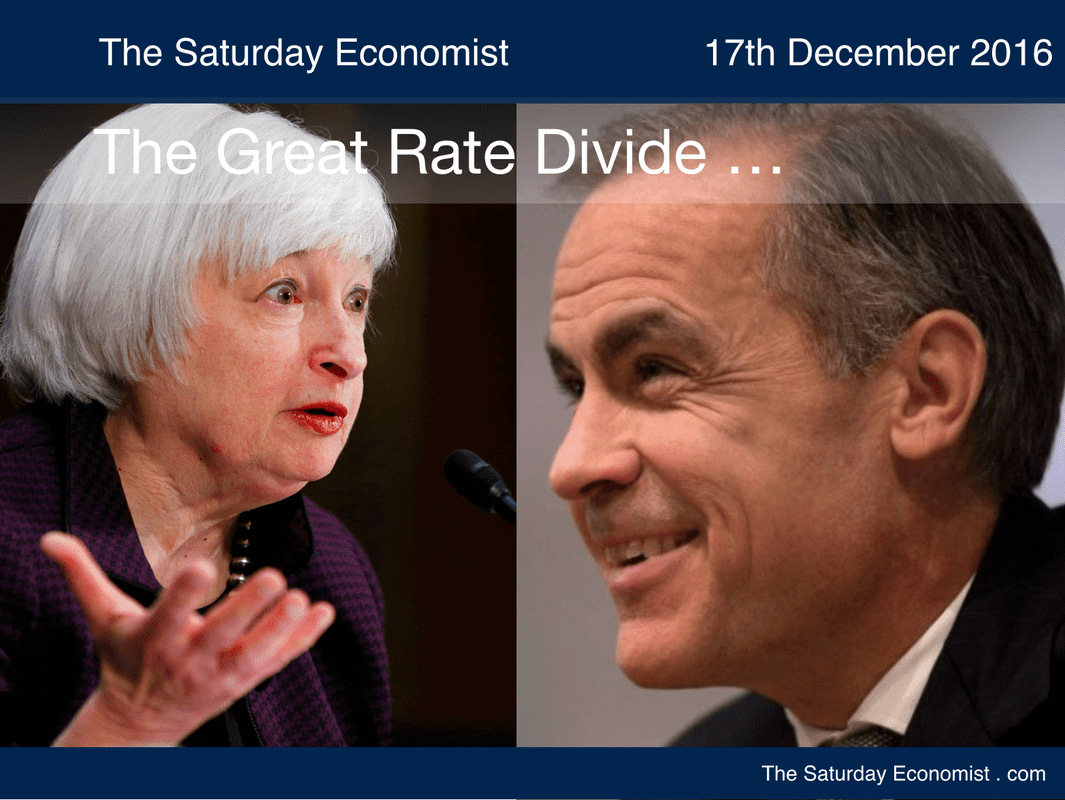
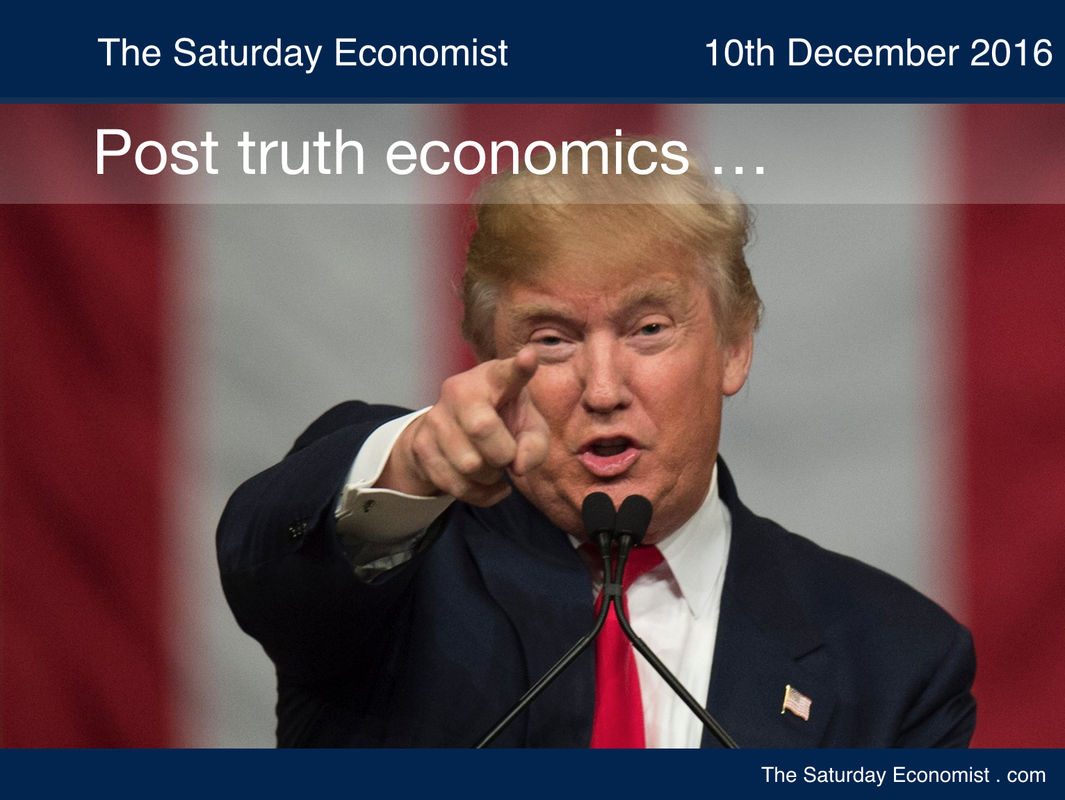
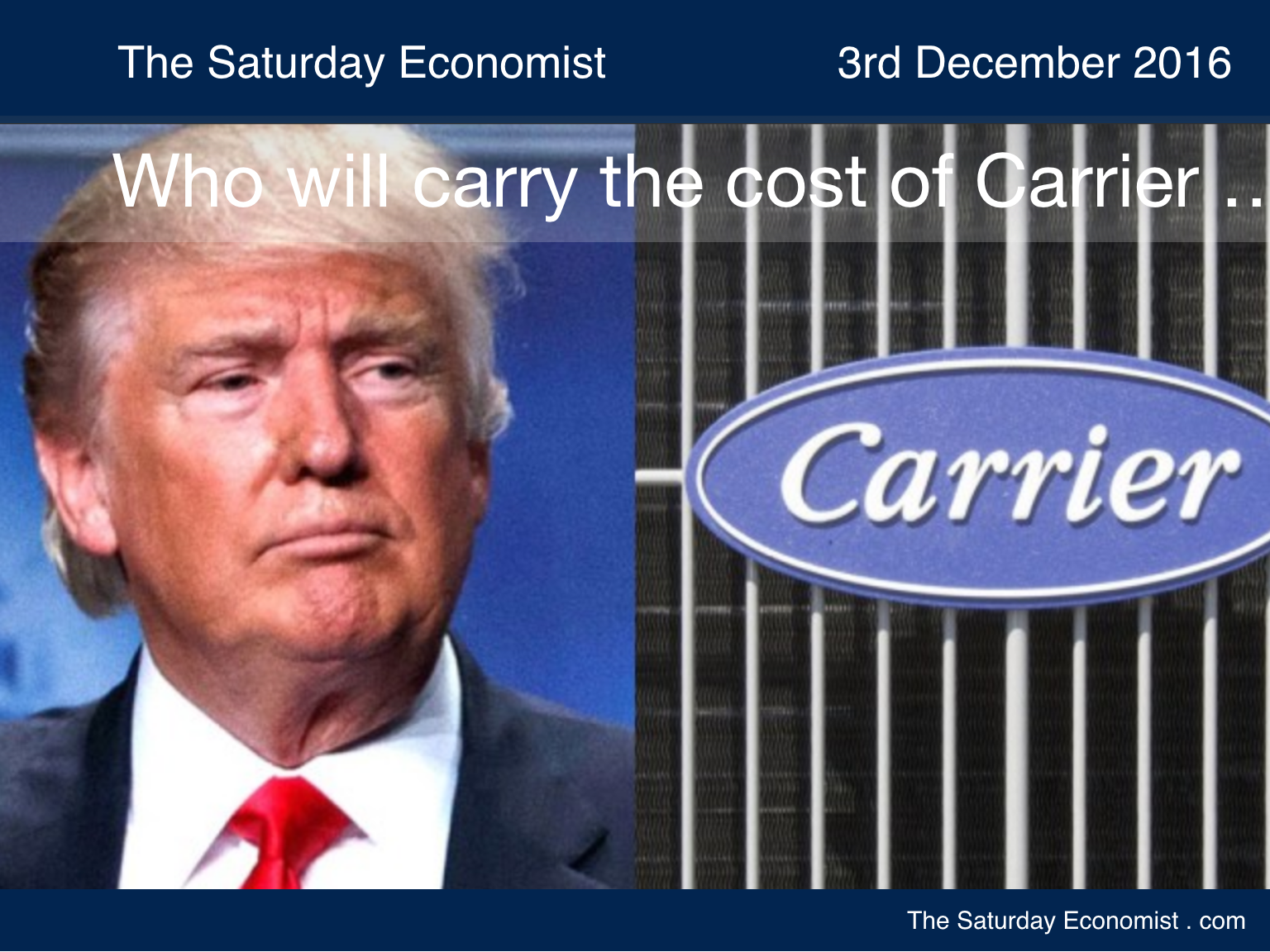
 RSS Feed
RSS Feed